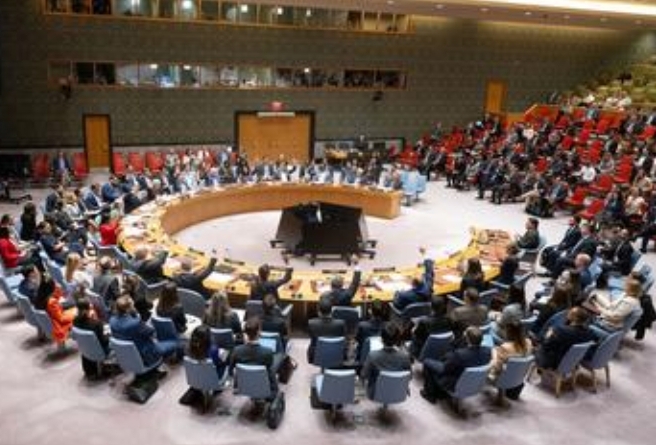The U.S. vetoed a U.N. resolution for a Gaza ceasefire, citing lack of hostage release conditions, drawing global criticism and accusations of shielding Israel.
U.S. Vetoes UN Security Council Ceasefire Call Over Hostage Concerns


The United States on Wednesday vetoed a United Nations Security Council resolution that demanded an immediate and permanent ceasefire in Gaza. The U.S. cited the resolution’s failure to link the ceasefire to the release of hostages, arguing that such a move would embolden Hamas militants. The other 14 members of the council voted in favor of the resolution, which described the humanitarian situation in Gaza as “catastrophic” and urged Israel to lift all restrictions on the delivery of aid to the 2.1 million Palestinians residing in the territory.
The resolution, presented to the U.N.'s most powerful body, also did not meet two additional conditions set by the United States: it did not condemn the deadly attack carried out by Hamas in Israel on October 7, 2023 — which marked the beginning of the conflict — nor did it call for Hamas to disarm and withdraw from Gaza.
Acting U.S. Ambassador Dorothy Shea addressed the council before the vote, stating that the resolution would undermine Israel’s security — a key U.S. ally — and hinder ongoing diplomatic efforts to achieve a ceasefire that reflects the complex realities on the ground.
U.S. Secretary of State Marco Rubio also weighed in, asserting that the resolution would have empowered Hamas. “Hamas could end this brutal conflict immediately by laying down its arms and releasing all remaining hostages,” Rubio said in a statement.
Israel’s U.N. Ambassador Danny Danon expressed gratitude to the United States for its stance. He criticized the resolution for not making the release of hostages a prerequisite for a ceasefire, arguing that such an omission would have placed undue pressure on Israel while affording Hamas more time, leverage, and political cover.
However, the U.S. veto — its fifth since the onset of the war — faced strong criticism from other Security Council members, who accused the United States of shielding Israel from accountability.
Chinese Ambassador to the U.N. Fu Cong stated that Israel's actions had “crossed every red line” of international humanitarian law and violated U.N. resolutions. “Yet, due to the shielding by one country, these violations have not been stopped or held accountable,” he said.
British U.N. Ambassador Barbara Woodward, typically an ally of the United States, strongly condemned Israel’s conduct. “This Israeli government’s decisions to expand its military operations in Gaza and severely restrict aid are unjustifiable, disproportionate and counterproductive, and the U.K. completely opposes them,” she said.
Pakistan's Ambassador Asim Iftikhar Ahmad criticized the U.S. veto as a “complicity” and a “green light for continued annihilation.” He described it as a pivotal moment when the world expected meaningful action, only to see the Security Council’s efforts blocked once again by a single member.
Slovenia’s U.N. Ambassador Samuel Žbogar, representing the 10 elected council members, emphasized that the resolution was carefully framed to avoid triggering a veto by focusing on the humanitarian emergency and the critical need for unrestricted aid access. “Starving civilians and inflicting immense suffering is inhumane and against international law,” he told the council. “No war objective can justify such action. We had hoped and expected that this was our shared understanding.”
Palestinian U.N. Ambassador Riyad Mansour called for governments worldwide to take tangible measures to pressure Israel into withdrawing from Gaza. He warned of an alleged Israeli plan aimed at destroying the Palestinian people. He also announced that Palestinians would bring a similar humanitarian-centered resolution to the 193-member General Assembly in the coming days. Although General Assembly resolutions are not legally binding, they are widely viewed as an indicator of global sentiment.
The U.S. had previously vetoed a Security Council resolution on Gaza in November under President Biden, also because it did not tie the ceasefire to the release of hostages. The latest resolution did call for the release of those captured by Hamas and other groups, but it stopped short of making that release a condition for a ceasefire.
Meanwhile, the administration of President Donald Trump has intensified its efforts to broker peace in Gaza following more than 20 months of war. However, Hamas has reportedly rejected parts of a new U.S. proposal, with special envoy Steve Witkoff describing the group’s suggested amendments as “totally unacceptable.”

 বাংলা
বাংলা  Spanish
Spanish  Arabic
Arabic  French
French  Chinese
Chinese 
